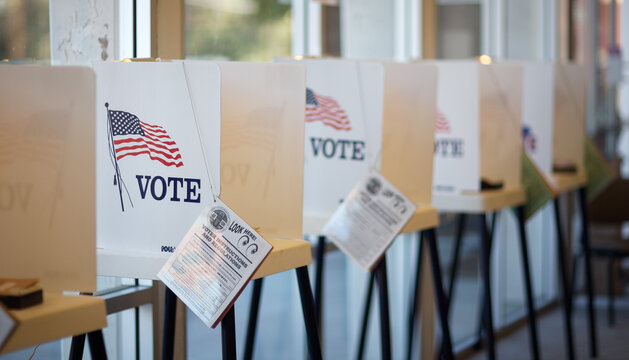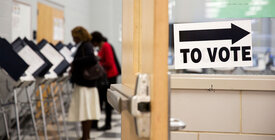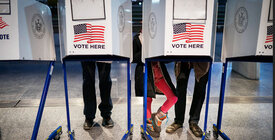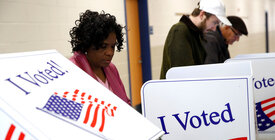Click here for the most recent Voting Laws Roundup >>
About half of the states’ 2024 legislative sessions have concluded, and the general election is six months away. So far, the new voting laws enacted in 2024 are following the trends set in 2021. Some states have put new voting restrictions in place while others have enacted new laws that make voting easier.
Between January 1 and May 3, 2024:
- At least six states enacted seven restrictive laws.1 Most notably, Alabama and Idaho each passed significant new restrictions. Five of the seven new laws2 in five states (Alabama, Arizona, Idaho, Indiana, and Tennessee) will be in place for the 2024 general election.
- At least one state, South Dakota, passed an election interference law, which goes into effect on July 1.3
- At least 11 states enacted 14 expansive laws, the most notable being one in Kentucky that widely expands absentee voting access.4 Twelve of these laws, including Kentucky’s, will be in effect for this year’s general election.5
The most restrictive of the new laws prohibit certain forms of assistance with absentee voting.6 This is consistent with the trend of some state legislatures making it a priority to curtail access to voting by mail, which we’ve tracked since the expansion and record use of mail voting at the height of the Covid-19 pandemic in 2020.
Many states continue to improve the voting process rather than create restrictions, with mail voting once again the focal point.
A significant trend this year is the introduction of bills that would regulate the use of deepfakes and AI-generated content in elections, as emerging technology heightens concerns about the spread of disinformation. AI-generated content has now reached a point where it can produce close-to-perfect picture, video, and audio imitations of people. With little effort or time, hoaxers can now create phony election materials that appear authentic — such as the flood of robocalls imitating President Biden that encouraged voters to skip the presidential primary earlier this year.
Another trend in 2024 is lawmakers considering bills related to noncitizen voting. While some of these would not create new restrictions (noncitizen voting is illegal under federal law and the law in every state, outside of a small handful of local elections), others risk disenfranchising eligible voters, and all of them may scare or confuse immigrants who have become citizens and are eligible to vote. There is no evidence that voting by noncitizens occurs in more than minuscule numbers.
New Laws on the Books for the 2024 Election
Ahead of the general election, a complete picture is developing of where casting a ballot will be harder than it was four years ago. Some states have spent the past few years piling on restrictions. In at least 21 states,7 voters in the 2024 election will face restrictions they’ve never encountered before in a presidential or midterm election. Voters in 28 states8 will face restrictions that weren’t in place in the last presidential election.
Since 2020, many of the same state legislatures that added new voting restrictions have also passed laws that open the door to election interference. At least 13 states9 will have an election interference law in place this year that was not in place for the 2020 election. Six states10 will have at least one interference law in effect that was not in effect for the 2022 midterms.
New Laws on the Books Since the Supreme Court Gutted the Voting Rights Act
Counting the latest additions from this year, at least 31 states have passed 103 restrictive voting laws since the Supreme Court gutted a key portion of the Voting Rights Act in Shelby County v. Holder in 2013.
Endnotes
-
1
AL S.B. 1, AZ H.B. 2785, ID H.B. 599, IN H.B. 1264, TN S.B. 1967, TN S.B. 2586, WV S.B. 624. Legislation is categorized as restrictive if it contains one or more provisions that would make it harder for eligible Americans to register, stay on the voter rolls, or vote as compared to existing state law. -
2
TN S.B. 1967 takes effect the day after the November election, while WV S.B. 624 will not be in place until January 1, 2025. -
3
SD H.B. 1182. Legislation is categorized as interference if it either threatens the people and processes that make elections work or increases opportunities for partisan interference in election results or administration. -
4
AZ H.B. 2785, ID H.B. 532, IN H.B. 1265, KY H.B. 580, MS S.B. 2576, NE L.B. 20, OR S.B. 1533, OR S.B. 1538, TN S.B. 2118, VA H.B. 441/VA S.B. 605, VA H.B. 1330, WA H.B. 1962, WA S.B. 5890, WI A.B. 298. Legislation is categorized as expansive if it contains one or more provisions that would make it easier for eligible Americans to register, stay on the voter rolls, or vote as compared to existing state law. -
5
OR S.B. 1533 takes effect on January 1, 2025, while WA H.B. 1962 will not be in place until June 1, 2025. -
6
AL S.B. 1, ID H.B. 599. -
7
Alabama, Arizona, Arkansas, Florida, Idaho, Indiana, Kansas, Mississippi, Nebraska, New Hampshire, New Jersey, New Mexico, North Carolina, North Dakota, Ohio, Oklahoma, South Dakota, Tennessee, Texas, Utah, and Wyoming. While West Virginia passed a restrictive voting law this year, the law will not take effect until after the general election. -
8
Alabama, Arizona, Arkansas, Florida, Georgia, Idaho, Indiana, Iowa, Kansas, Kentucky, Mississippi, Missouri, Montana, Nebraska, New Hampshire, New Jersey, New Mexico, New York, North Carolina, North Dakota, Ohio, Oklahoma, South Carolina, South Dakota, Tennessee, Texas, Utah, and Wyoming. -
9
Alabama, Arizona, Arkansas, Florida, Georgia, Iowa, Kansas, Kentucky, Missouri, North Dakota, Oklahoma, South Dakota, and Texas. North Carolina would have been one of these states, but its new interference law, S.B. 749, was struck down by a state court. The case is now on appeal. -
10
Arizona, Arkansas, Florida, Georgia, South Dakota, and Texas.




